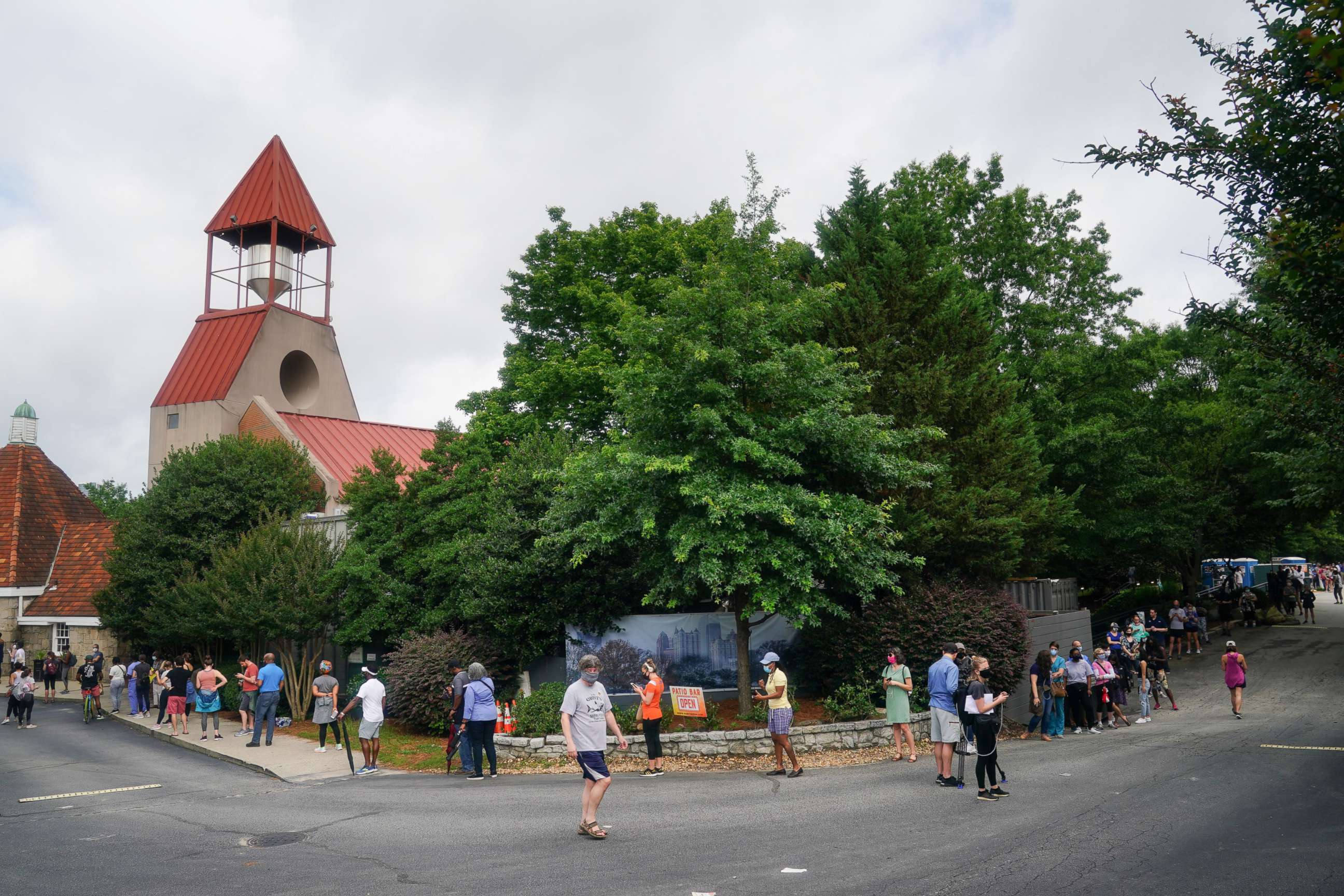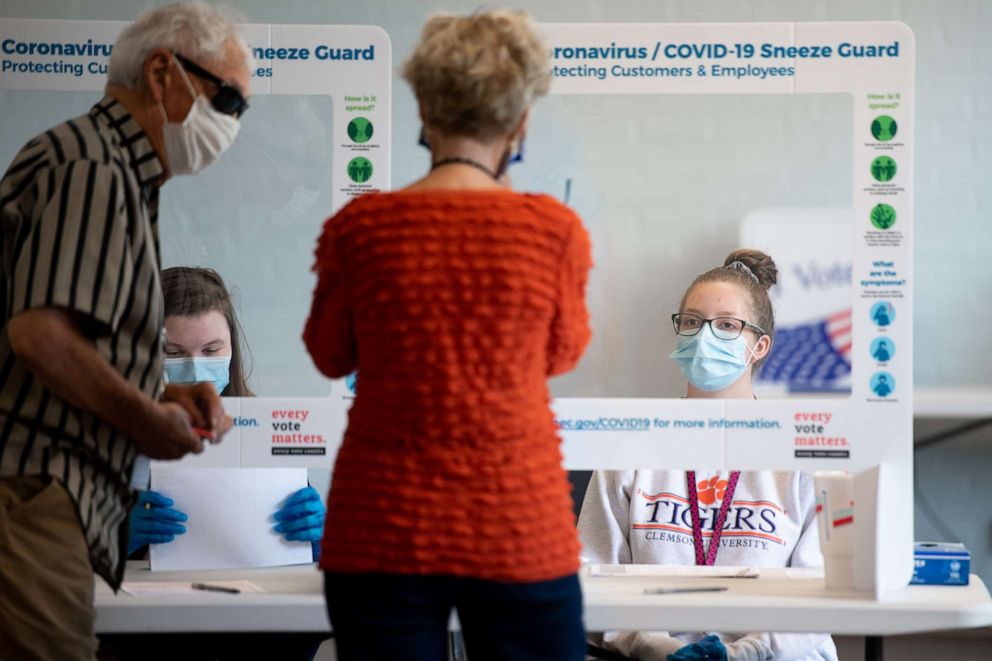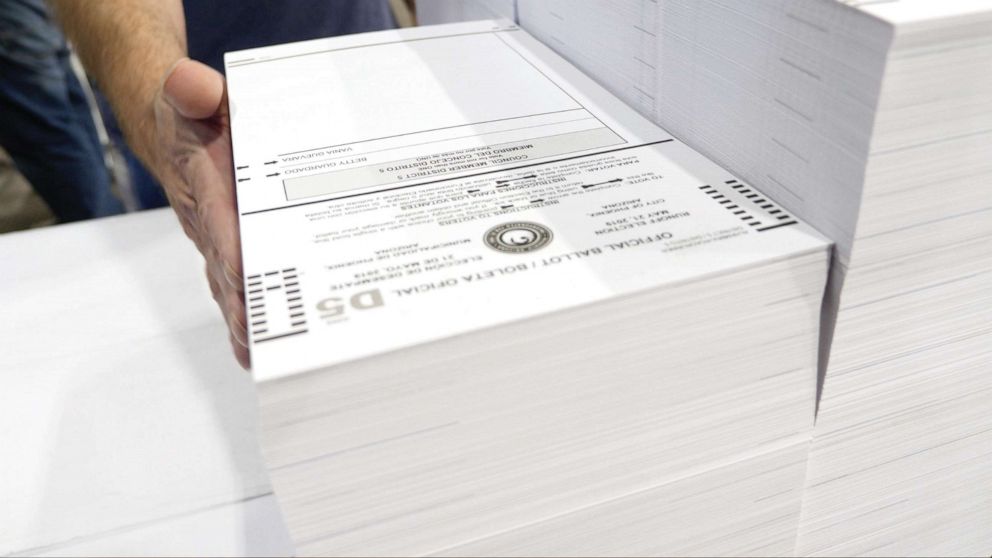Mail-in voting is hot during pandemic, but are states ready?
Four states are resisting calls to expand vote-by-mail options.
Widespread concern about catching COVID-19 at polling places this November is setting the stage for a record-breaking election for votes by mail.
One in five Americans voted by mail in 2016. Experts predict as many as half of all registered voters could send in their ballots in 2020.
"I think it could approach 100 million," said Amber McReynolds, CEO for the National Vote At Home Institute and former director of elections in Denver.
The surge of interest in mail-in voting is testing states and counties already battered by the coronavirus pandemic and recession. Election officials are scrambling to amend their absentee ballot rules, boost orders for printed materials, and hire and train enough workers to count ballots by hand.
McReynolds said states and counties that are still deciding whether and how to expand their mail voting this fall need to decide now or risk not being able to give voters the option.
"Those are the sorts of decisions that have to happen in June. Like this month. It's not a September decision. It's not an October decision. It's literally right now to make sure election officials can adjust," she said.

Six states are preparing to automatically send ballots this fall to every registered voter, including nearly 20 million in California, which joined the list last month because of the pandemic.
Dozens of others that already allow eligible voters to apply for a mail-in ballot are taking steps to increase participation, by preemptively sending out applications and clarifying that fear of the novel coronavirus is a legitimate reason to vote absentee.
Companies that print ballots told ABC News that there's a danger they won't be able to meet the increased demand if orders for mail-in ballots come too late.
"If counties sign up, if we get full, we're full," said Jeff Ellington, president of Runbeck Election Services, one of the largest ballot printers in the country, which is already churning out ballots around the clock.
Ellington says his company can print up to 20 million ballots, but more than 9 million are already spoken for. "We can't add more equipment. We can't add more people. We can't add more space," he said.
Runbeck's machine supplier, W+D Lenexa, said it cannot produce any additional machines before the election.
''We didn't anticipate this kind of demand," said W+D Lenexa vice president of marketing Andrew Schipke.
If the number of Americans voting by mail approaches 100 million like McReynolds believes, Schipke thinks there could be a shortfall of up to 15 million mail-in ballots.
"I'm not concerned about running out of ballots or not allowing people to vote," Ellington said, acknowledging that voters will still be able to cast ballots in-person nationwide. "It's just going to create more stress on a system if people delay and then states are going to decide to go vote by mail."

There's also worry a crush of mail ballots could overwhelm states that haven't planned ahead for the election night count.
"We're used to knowing who the next president of the United States is sometime on the evening of the election; but that's predicated on knowing who wins all of the battleground states," said ABC News political director Rick Klein. "And in states like Pennsylvania, Georgia, Wisconsin, Michigan that have expanded mail in voting in a significant way, it could delay the count."
Michigan’s local elections last month shattered records for voter participation with 99% of all votes coming through the post office. In Missouri and New Hampshire, Republican governors recently approved changes to allow anyone concerned about the coronavirus to vote absentee this fall.
In Harris County, Texas, home to nearly 2.4 million registered voters -- the third most of any county in the country -- officials are braced for an influx in absentee requests.
"The counting piece is the hard part. We're already moving through the process of procuring additional counting machines," County Clerk Christopher Hollins told ABC News.
Nevada on Tuesday for the first time asked primary voters to mail or drop-off their ballots rather than visit polling places, while in Georgia, Republican state officials shifted their primary election to almost entirely by mail -- a record more than 1 million absentee ballots received before election day.
The expansion of mail-in voting was not without problems. Some Georgia voters who never received a mail ballot were forced to head to the polls to cast a ballot in-person, where they faced long lines, delayed poll openings and issues with voting machines.
The Centers for Disease Control and Prevention is urging all states to expand mail-in voting as much as possible to "minimize direct contact with other people and reduce crowd size." In April, more than five dozen people in Wisconsin tested positive for COVID-19 after voting in person or working at the polls.
But four states -- Texas, Tennessee, Louisiana and Mississippi -- are resisting expansion of vote by mail, citing financial concerns, lack of equipment and worry about fraud.
"We want to make sure in this time of uncertainty every American is able to vote safely, but we cannot derail the safeguards that ensure election integrity," Republican National Committee chairwoman Ronna McDaniel told ABC News Live last month. "And having governors sending ballots to inactive voters that have moved away or passed away does ensure election integrity."
There's no widespread evidence of voter fraud -- either in-person or by mail, which has been used since the Civil War.
And, while President Donald Trump has claimed mail-in balloting "doesn't work out well for Republicans," researchers at Stanford University studying 20 years of election data found "no apparent effect" of vote-by-mail on election outcomes despite partisan concerns.

"There are lots of safeguards put in to try to prevent the kind of nightmare scenarios that President Trump and others have warned about," said Klein. "There's always going to be the potential for fraud; there's always going to be potential for abuse; but it just hasn't been borne out by the evidence and the places that have expanded vote by mail."
In Texas, a key 2020 battleground, the fight over vote-by-mail is playing out in court where voter groups have sued the Republican-led state government to make mail ballots available to everyone.
"I'm kind of close to that age group that they say, don't go out. And I have asthma, so I worry about that," said 61-year-old Texas school teacher and political Independent Diana Hood, who wants to vote-by-mail in November to avoid the risk of COVID-19.
Under state rules, Hood doesn't qualify. In Texas, only voters over 65, with a disability or illness, in jail or traveling overseas can apply for a mail ballot -- one of the strictest standards in the country.
"I guess you could lie, but I don't want to do that," she said. "If other states can handle it, why can't Texas?" she said of giving voters the option to vote by mail.
So far, state and federal courts have blocked the effort to force Texas to do more.
"There is no reason -- capital N, capital O -- no reason that anyone under 65 should be able to say 'I'm afraid to go vote,'" Texas Lt. Gov. Dan Patrick told Fox News in a live interview last month. "You have more chance of being in a serious auto accident if you're under 65 on the way to vote than you do from catching the virus and dying from it by voting."
Nearly a third of all Texans who have died from COVID-19 were under the age of 65, according to the Department of State Health Services.
As the vote-by-mail legal battle continues, Hood says she's prepared to vote in person even if it means risking her health.
"I could go early and sneak in during the day when there's not many people there. I guess my feeling more than anything is, so why not? Why can't we have that option if people want?"
What to know about the coronavirus:
- How it started and how to protect yourself: Coronavirus explained
- What to do if you have symptoms: Coronavirus symptoms
- Tracking the spread in the U.S. and worldwide: Coronavirus map
Tune into ABC at 1 p.m. ET and ABC News Live at 4 p.m. ET every weekday for special coverage of the novel coronavirus with the full ABC News team, including the latest news, context and analysis.




